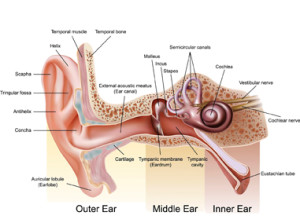Everyday Noises & Hearing Loss
Posted on April 30, 2015 by bob in Health
About 14 percent of people between the ages of 45–64 have some type of hearing loss, which you might notice as difficulty following conversations or trouble hearing children and women with high voices. Though one in three people over the age of 65  have hearing loss, they tend to wait a long time before doing something about it—seven years on average. The reasons for delaying treatment probably sound familiar:
have hearing loss, they tend to wait a long time before doing something about it—seven years on average. The reasons for delaying treatment probably sound familiar:
-Denial and the perception the problem isn’t that serious
-Negative associations of hearing loss and being old or disabled
-Due to gradual onset, those with hearing loss literally don’t know what they are missing
-Not realizing that some hearing loss can be kept from worsening by early treatment
Why Hearing Loss Happens
There are three types of hearing loss: conductive (CHL), sensorineural (SNHL), and mixed which includes both types.
CHL hearing loss is a mechanical problem: for some reason, your outer or middle ear isn’t able to vibrate properly in response to sound waves. Causes include too much ear wax, fluid due to infection, a hole in the eardrum, and otosclerosis, which is an overgrowth of the bone in your middle ear.
SNHL is the most common type of hearing loss and is caused by noise exposure, medications and age, to name a few. “Though hearing loss is often attributed to natural aging, in fact, hearing loss may be congenital (inherited) or exacerbated by excessive noise,” says audiologist Leigh Ann Watts, Au.D., CCC-A. ”Noise is all around us, every day, from television to lawn mowers to household appliances. It’s unavoidable, yet can be harmful in excess.”
What Counts as Excessive Noise?
Frightening fact: Hearing loss can occur after a one-time noise exposure at 120 decibels, such as gunfire, or continuous noise exposure to dangerous levels of 85 decibels or above over a prolonged period of time. It’s important to know what levels are safe in order to protect your hearing:
110-140 decibels
(One minute of exposure at this level can result in permanent hearing loss, according to the National Institutes of Health):
-Rock concert or jet engine
-Firecracker
-Nail gun
-Ambulance siren
-Chainsaw
-Home stereo speakers at maximum volume
85-100 decibels
(Continual exposure in this range can cause permanent hearing loss)
-Garbage truck
-Power mower
-Motorcycle
-Snowmobile
-Jackhammer
“I recommend maintaining levels below 75 decibels and listening to your ears,” says Dr. Watts. “If a sound is too loud, remove yourself from the situation or put on proper hearing protection.” For reference, a normal conversation typically hits about 60 decibels.
What You Can Do If You Do Have Hearing Loss
Fortunately, 90 percent of SNHL hearing loss (caused by excessive noise or aging) can be improved by wearing a hearing aid, and CHL hearing loss (caused by a mechanical problem) can be reversed or significantly improved with medical or surgical treatment, says Dr. Watts.
No matter your specific needs or lifestyle, she recommends the following hearing aid features, if you and your doctor decide to go that route:
1. Directional microphones – this feature has been proven to improve hearing in places with heavy ambient noise.
2. Telecoils – this special circuitry within a hearing aid prevents feedback (or whistling) when you’re on the phone.
3. Bluetooth technology – this allows for wireless connection from your hearing aid directly to cell phones and TVs.
4. Rechargeable hearing aid batteries – these are a super convenience and a must for people with visual or dexterity issues.
If you’re over 50, hearing aids may conjure visions of clunky, uncomfortable monstrosities—a cure worse than the condition. But today’s hearing aids come in comfortable, discreet designs and provide natural-sounding hearing in a wide variety of environments. Another modern benefit: Hearing aids are also available with tinnitus therapy settings for those suffering from ringing in the ear.
Courtesy: grandparents.com, a lifestyle site that celebrates the grandparent community by providing trusted information about family & relationships, health & well-being, travel & retirement, and more. Follow the site on Twitter (@grandparentscom) and on Facebook (facebook.com/grandparentscom).









